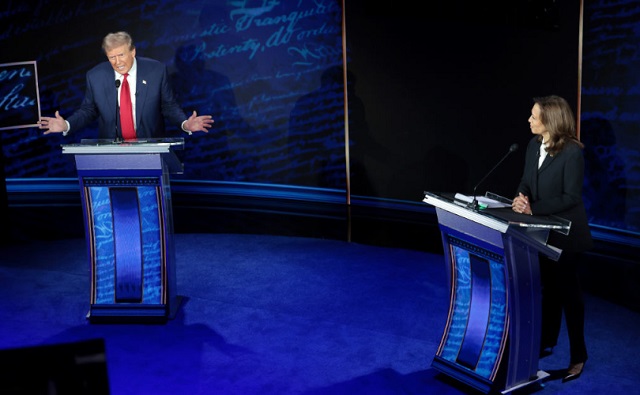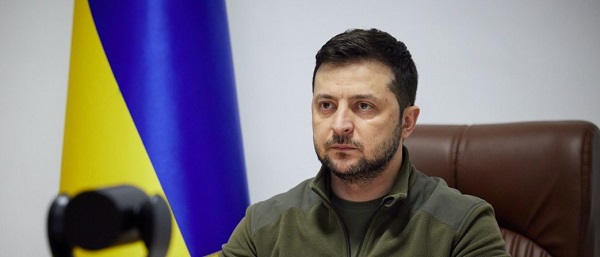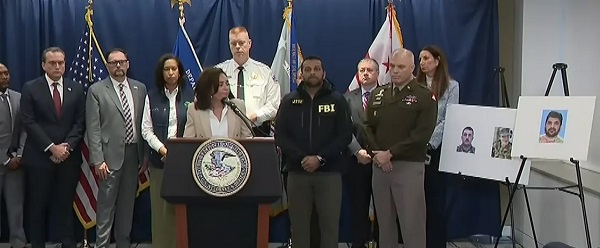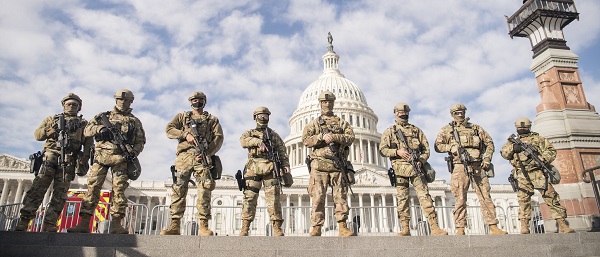International
Former Clinton adviser calls for investigation of ABC debate between Trump, Harris

From LifeSiteNews
By Stephen Kokx
Mark Penn, chairman of the Harvard CAPS Harris Poll, believes there is a likely chance that ABC colluded with the Harris campaign.
A former adviser to Bill and Hillary Clinton is calling for an investigation into the recently concluded presidential debate between Kamala Harris and Donald Trump.
During an appearance on the “John Solomon Reports” podcast, Mark Penn said he believes there is a likely chance that ABC colluded with the Harris campaign.
Describing the debate as a “staged wrestling match,” Penn commented that he thinks ABC “should do a full internal investigation, hire an outside law firm. I don’t know how much of this was planned in advance.”
Penn, chairman of the Harvard CAPS Harris Poll, previously worked at Microsoft and founded a prominent polling firm that has helped many high-profile public officials, including former president Bill Clinton. In recent years, he has grown close to Trump, even advising him on his impeachment in 2019.
Penn remarked on X that the “referees” of the debate were unfair and that had the moderators overseen the first debate between Trump and Joe Biden, Biden might still be in the race, as they were clearly in favor of Harris.
There can be no fair game or debate no matter what the score when the referees put their fingers on the scale.
What ABC did in poorly fact checking one side while letting the other side repeat serial falsehoods meant that one side had to do its own defense.
It robs all sides…
— Mark Penn (@Mark_Penn) September 11, 2024
He further told Solomon that the “suspicion here is really quite high, and I think a review of all their internal texts and emails really should be done by an independent party to find out to what extent they were planning on, in effect, you know, fact-checking just one candidate and in effect, rigging the outcome of this debate. I think the situation demands nothing less than that.”
Since the debate, the Trump campaign has pointed out that moderators David Muir and Linsey Davis repeatedly “fact-checked” Trump but did not do so even one time with Harris. Some have also noted that Davis belongs to the same sorority as Harris and that the failure to disclose that detail was unprofessional in the least, if not a blatant conflict of interests.
Debate conflict of interest with ABC moderator Linsey Davis CONFIRMED. She is a sorority sister of Kamala Harris, and even confirmed it on a live broadcast 3 1/2 years ago. pic.twitter.com/eoJihVpZp1
— WorldNetDaily (@worldnetdaily) September 12, 2024
While Trump and his surrogates have claimed victory in the debate, not all conservatives agree with that assessment. Former Congressman Trey Gowdy told Fox News that Trump should fire the people who prepared him for the debate, which he called the “land of missed opportunities.” Fox pundit Brit Hume likewise said Trump had a “bad night” getting baited repeatedly by Harris.
Polls seem to suggest that Harris has gained several points in the last 72 hours, with betting markets now being less optimistic about a Trump victory in November. At the same time, forecaster Nate Silver gives Trump at a 60% chance of winning the Electoral College.
Unconfirmed reports on social media suggested that a possible ABC “whistleblower” may be on the verge of coming forward with evidence that the outlet fed Harris the questions ahead of time. LifeSite has found no reliable evidence of that being true as of the publication of this story. What LifeSite can confirm is that in 2016, former Democratic National Committee interim chair Donna Brazile leaked questions to the Clinton campaign that were going to be asked at a CNN town hall.
Trump recently announced that he will not participate in another debate before this year’s elections on Tuesday, November 5. Democrats currently hold a narrow edge in the U.S. Senate with 47 members plus four independents who caucus with them for a total of 51 in comparison to 49 Republicans. The House of Representatives is run Republicans, who have 220 members to 211 Democrats.
Daily Caller
Zelenskyy Under Siege As Top Aide Resigns After Home Raided In Major Corruption Scandal


From the Daily Caller News Foundation
Ukrainian President Volodymyr Zelenskyy’s chief of staff, Andriy Yermak, resigned Friday after his home was raided in an ongoing corruption probe that threatens to undermine Zelenskyy’s grip on power during wartime.
Ukrainian authorities on Friday raided the home of Andriy Yermak, Zelenskyy’s chief of staff and right-hand man, as part of a sweeping corruption probe investigating Zelenskyy’s possible involvement in a $100 million scheme to defraud the nation’s atomic energy company. Yermak’s resignation comes at a time when Zelenskyy is under increasing pressure to accept a U.S.-brokered peace deal to end Ukraine’s war with Russia.
The investigation has shaken Ukrainian confidence in Zelenskyy’s administration while Russian strikes continue to rock critical infrastructure. So far, Russia has not commented on the new proposed peace deal.
As a nonprofit, we are dependent on the generosity of our readers.
Please consider making a small donation of any amount here.
Thank you!
Zelenskyy first rose to power on an anti-corruption platform in the 2019 elections, which propelled him into the international spotlight. He has enjoyed a positive global reputation during the three-year war with Russia and has been hailed by numerous Western leaders as a beacon of democracy against autocratic Russia.
Zelenskyy has so far worked with the U.S. on the proposed peace agreement, but has also expressed major reservations about what it will mean for his country. In a public address on November 21, Zelenskyy said the plan puts Ukraine in the position of “either losing its dignity or the risk of losing a key partner.”
Despite the prospect of losing U.S. intelligence sharing and weapons if Ukraine doesn’t accept the deal, Zelenskyy has been shoring up European alliances and international support, most recently signing a deal with France to obtain 100 Rafale jets for its air force. The deal also included anti-air equipment, drones and other munitions.
The Ukrainian Ministry of Foreign Affairs did not immediately respond to the Daily Caller News Foundation’s request for comment.
International
Identities of wounded Guardsmen, each newly sworn in

The two West Virginia National Guard members critically wounded in Wednesday’s ambush near the Farragut West Metro Station have now been identified as Andrew Wolfe and Sarah Beckstrom — young soldiers who had taken their oaths less than a day before gunfire erupted on a downtown Washington sidewalk.
Wolfe, 22, was identified first after Musselman High School in Inwood released a statement confirming the alumnus was one of the soldiers struck. The school said the community was “deeply saddened” and urged residents to pray for him. Wolfe was rushed into surgery and remains in critical condition.
Support poured in across the Eastern Panhandle throughout the day. Friends shared old photos and messages urging him to “keep fighting.” Wolfe, who lives in Martinsburg, is active in the region’s cornhole community, and the Beltway Baggers — organizers of ACL tournaments in Virginia — posted a photo of him flashing a peace sign while asking members to pray for his recovery. “He was shot today while serving our country,” the group wrote.
Federal officials identified the second Guardsman on Thursday as 20-year-old Sarah Beckstrom. U.S. Attorney Jeanine Pirro said Beckstrom had just taken her oath of enlistment and was barely a day into her service when she was gunned down. She underwent emergency surgery and remains in critical condition.
According to investigators, 29-year-old Rahmanullah Lakanwal — an Afghan national admitted to the U.S. following the Kabul evacuation — allegedly stepped from behind a corner and opened fire at close range as the two patrolled under a heightened security directive in the capital. Beckstrom was hit first. Wolfe was shot moments later.
Pirro said both families are at the hospital as doctors fight to keep the soldiers alive. She warned that if either succumbs to their injuries, prosecutors will pursue a first-degree murder charge. “If one of them is to pass — and God forbid that happens — this becomes murder one. That’s it.”
Pirro urged Americans to pray for the wounded Guardsmen. “On a day when families gather together, I ask you to pray for these two young people — that they survive.”
-

 Alberta6 hours ago
Alberta6 hours agoFrom Underdog to Top Broodmare
-

 armed forces2 days ago
armed forces2 days ago2025 Federal Budget: Veterans Are Bleeding for This Budget
-

 Alberta1 day ago
Alberta1 day agoAlberta and Ottawa ink landmark energy agreement
-

 Artificial Intelligence2 days ago
Artificial Intelligence2 days agoTrump’s New AI Focused ‘Manhattan Project’ Adds Pressure To Grid
-

 International1 day ago
International1 day agoAfghan Ex–CIA Partner Accused in D.C. National Guard Ambush
-

 Carbon Tax1 day ago
Carbon Tax1 day agoCanadian energy policies undermine a century of North American integration
-

 International1 day ago
International1 day agoIdentities of wounded Guardsmen, each newly sworn in
-

 International2 days ago
International2 days agoTrump Admin Pulls Plug On Afghan Immigration Following National Guard Shooting





